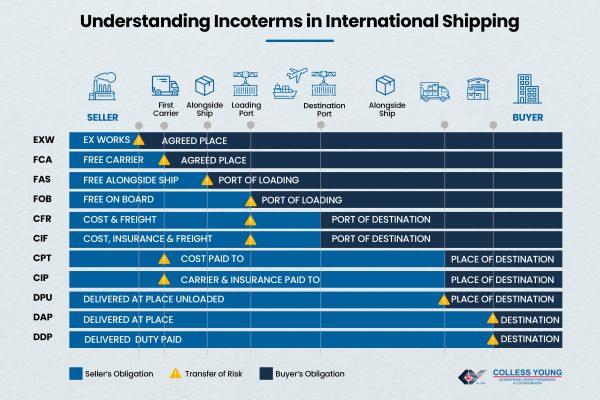If you are engaged in international shipping, knowing your Incoterms is essential to understanding ‘who is responsible for paying what’ in your supply chain. These terms represent various tasks, costs, risks and logistics of moving goods whether by sea cargo, airfreight and/or land transport. Misunderstanding them can distort you cost calculations.
International Commercial Trade Terms, or Incoterms for short, are each denoted by a three-letter abbreviation. These are legally binding terms and agreements which are followed by virtually all countries.
Incoterms range from EXW (Ex Works) where all the responsibility rests with the buyer, to DDP (Delivery Duty Paid) where the seller takes care of everything.
Every ten years, the International Chamber of Commerce (ICC) updates the Incoterms to ensure that they stay consistent with the current process of international trade. Incoterms were last updated on 01 January 2020, and include eleven unique types.
List of Eleven Incoterms:
- EXW – Ex Works: The seller’s responsibility is to make the goods available for pickup at the warehouse or factory. From that point forward, the buyer assumes responsibility for all costs and risks. As your freight forwarder, this means we arrange the entire shipment on your behalf, starting at pickup from the factory.
- FCA – Free Carrier: The seller is responsible for delivering the goods to the carrier at a named place, which is usually a container terminal or warehouse. Once the goods are handed over to the carrier, the risk transfers to the buyer.
- FAS – Free Alongside Ship: The seller is responsible for delivering goods to a departure location, usually the ship loading dock, including clearing them for export. Risk transfers to the buyer when the goods are placed alongside the ship.
- FOB – Free On Board: The seller is responsible for packaging, pickup, and delivery of goods onto a vessel at the port of shipment. Liability transfers to the buyer once the goods are on board the vessel.
- CFR – Cost and Freight: The seller is responsible for loading the goods onto the vessel and transportation to the destination port. (This used to be called C&F).
- CIF – Cost, Insurance, and Freight: Similar to CFR, but the seller also arranges and pays for insurance coverage for the goods during transit to the port of destination.
- CPT – Carriage Paid To: The seller is responsible for the costs of transporting the goods to a named destination. This will usually include destination terminal fees. Responsibility transfers to the buyer at the agreed-upon destination.
- CIP – Carriage and Insurance Paid To: This incoterm is the same as CPT except that with CIP, the seller also arranges and pay for insurance to cover loss or damage to the goods during transit to the agreed-upon destination.
- DAP – Delivered at Place: The seller arranges the entire shipment up to delivering the goods to a named place. This typically includes trucking costs at destination but the buyer assumes responsibility for import customs duties, fees, and taxes.
- DPU – Delivered at Place Unloaded: The seller is responsible arranging the shipment and delivering the goods to a named place. They are also responsible for unloading them. Risk transfers to the buyer once the goods are unloaded.
- DDP – Delivered Duty Paid: The seller is responsible for entire shipment process, including customs clearance and fees, and delivering the goods to the buyer’s premises. This Incoterm places the maximum responsibility on the seller.
Applying Incoterms Correctly.
For Incoterms to be contractually valid, they should be listed on the order or purchase agreement and sales contract as well as the proforma and final invoices. They communicate a binding agreement that outlines the responsibilities between the supplier and purchaser of goods in regards to the delivery to the products.
As language barriers and cultural differences are commonplace in international trade, these terms simplify an often-complicated process and help communicate a large portion of the process of transferring the goods from the seller to the buyer.
For an easy-to-read chart, go to our website and in the dropdown under Information, click on Shipping Terms.
For more information about Incoterms, talk to us here at Colless Young.
Contact Andrew, email enq@collessyoung.com.au Tel: +61 7 3890 0800.

